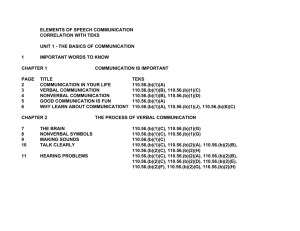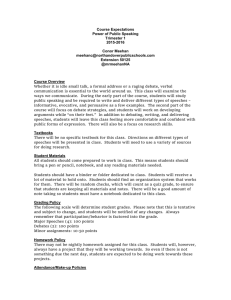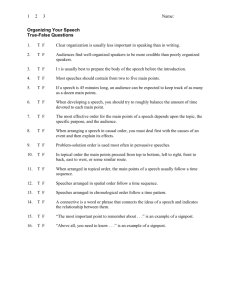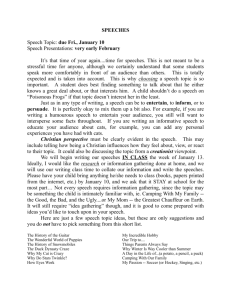IPRS - INTERSTENO PARLIAMENTARY REPORTERS' SECTION
advertisement
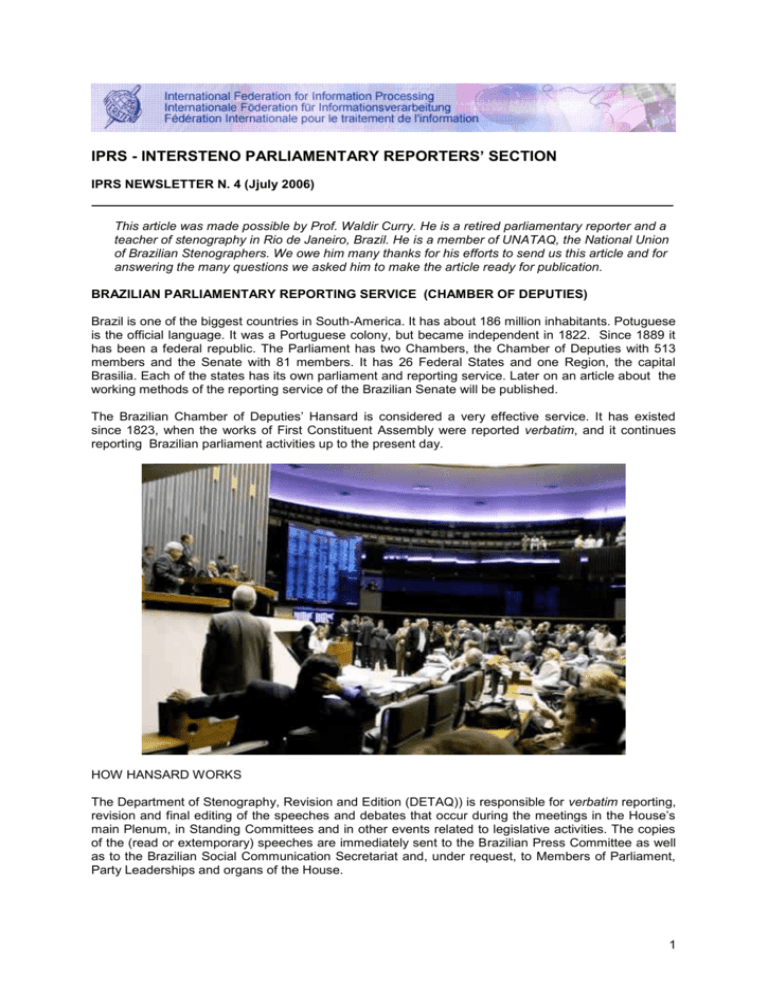
IPRS - INTERSTENO PARLIAMENTARY REPORTERS’ SECTION IPRS NEWSLETTER N. 4 (Jjuly 2006) This article was made possible by Prof. Waldir Curry. He is a retired parliamentary reporter and a teacher of stenography in Rio de Janeiro, Brazil. He is a member of UNATAQ, the National Union of Brazilian Stenographers. We owe him many thanks for his efforts to send us this article and for answering the many questions we asked him to make the article ready for publication. BRAZILIAN PARLIAMENTARY REPORTING SERVICE (CHAMBER OF DEPUTIES) Brazil is one of the biggest countries in South-America. It has about 186 million inhabitants. Potuguese is the official language. It was a Portuguese colony, but became independent in 1822. Since 1889 it has been a federal republic. The Parliament has two Chambers, the Chamber of Deputies with 513 members and the Senate with 81 members. It has 26 Federal States and one Region, the capital Brasilia. Each of the states has its own parliament and reporting service. Later on an article about the working methods of the reporting service of the Brazilian Senate will be published. The Brazilian Chamber of Deputies’ Hansard is considered a very effective service. It has existed since 1823, when the works of First Constituent Assembly were reported verbatim, and it continues reporting Brazilian parliament activities up to the present day. HOW HANSARD WORKS The Department of Stenography, Revision and Edition (DETAQ)) is responsible for verbatim reporting, revision and final editing of the speeches and debates that occur during the meetings in the House’s main Plenum, in Standing Committees and in other events related to legislative activities. The copies of the (read or extemporary) speeches are immediately sent to the Brazilian Press Committee as well as to the Brazilian Social Communication Secretariat and, under request, to Members of Parliament, Party Leaderships and organs of the House. 1 Every day, from 9 am onwards, copies of the stenographic reports (without final revision) are at the disposal of those who are interested in them. These are copies of the preceding day’s sessions and include the summary of the speeches, the list of propositions presented and discussions and voting results. These data can be found on the website: http:// www.camara.gov.br The speeches made in the plenary sessions of the Chamber are summarized and indexed by the Section of Debates Archive in five topics: date, speaker, subject, delegation and State. They are integrated in DETAQ’s database, which can be accessed in the whole country. Each Member can do research on subjects used in speeches with the indication of the dates when they were made and published in the Chamber of Deputies Daily, the list of propositions presented, a summary of questions of order raised and the historical development of their parliamentary activities. SPEAKER’S CORRECTIONS AND REVISION Members can correct their speeches and, observing the regulatory rules, they can also report, on the same day, their corrections to the Department, which will provide the respective transcription. If the speech is not sent back within five sessions, it will be published without the speaker’s corrections. Mostly the corrections refer only to words and numbers, but sometimes to the content of the speech. In those cases good sense prevails. But for important changes the final decision is up to the President of the Chamber, who then gets in touch with the Member concerned, either by phone or personally. The text produced must be as faithful as possible to the thoughts expressed in the original speech, without being a reproduction ipsis verbis, of the speaker’s words, since obvious linguistic inaccuracies, such as grammatical mistakes, should not be recorded. Researches about such matters as difficult spellings can be made to the immediate Head of the Coordination of Debates Archive (COHID), which has its own database and easy access to this type of material. TECHNICAL DEVELOPMENTS In order to achieve speed, quality and good presentation of the work performed, some improvements of great importance were introduced in DETAQ. With the work of the Stenographic Activities Computerizing System (SITAQ), the transcription, revision and final editing of the stenographic reports of plenary sessions and committee meetings began to be made on an internal network, thus eliminating the circulation and waste of paper. The reports of the plenary sessions, without final editing, are available on the Internet after each speech, as well as the summaries of the speeches made, lists of propositions presented and discussions and votes. Regarding audio usage, from the year 2000, computerized records in MP3 format were exclusively used, in addition to modernization of former practices. The recovery of sound data became very much easier and efficient.. An innovative DETAQ’s product is the “online session”, developed in association with the Informatics Center. In the direct consultation to the internet site of the Chamber of Deputies (www.camara.gov.br), the link “Plenum” and, afterwards, the link “Sessions” allow the user to access votings, debates, speeches – available within 30 minutes after each pronouncement and stored in the system for later consultation. They also allow recovery of speeches and debates recently registered and from former legislatures. The link “Discursos e Notas Taquigráficas” (Speeches and Stenographic Notes) brings 2 the following options for research: Instantaneous Register of Plenum; Transcription of Stenographic Notes; Summary of Hansard. RECRUITING OF NEW REPORTERS Hansard reporters are hired after a rigorous public exam in which merit prevails. They are assessed on various areas of knowledge, mainly regarding technical skills needed to perform such peculiar, dynamic and fascinating activity. All of them master the technique of fast written shorthand. Some have professional experience, others are at the beginning of the path. Parliamentary reporting, more than other areas, comprises distinctive features in the development of the work, and it is necessary to know them. Every year there is a public test in shorthand, organized by Taquibrás, an institute conducting shorthand courses in Brazil with hundreds of students. The best ones are prepared to take part in the shorthand tests for the Parliament, other Assemblies and Tribunals. Those who have passed the parliamentary test succesfully learne the working methods of the Chamber from the other reporters. The set of stages for stenographic activities in the Chamber of Deputies – registering, revision and supervision – is paradoxically contradictory. It is performed individually, independently, the reporter being isolated most of the time, but the final result is basically obtained in a group. Teamwork means integration, solidarity. Here is, therefore, the line that permeates the reporters’ work: accurate notion of solidarity, understood as the relation of responsibility around common interests and goals. DETAQ does not expect to receive employees who are simple performers of duties. Instead, it intends to count on employees with initiative – in the sense of being entrepreneurs – who shows curiosity – in the sense of wanting to learn more – and, finally, to count on employees compromised with the Department, making a great team. HISTORY OF DETAQ The introduction of parliamentary stenographic services in the Brazilian parliament occurred on May 3, 1823, when the First Constituent Assembly was established. José Bonifácio de Andrada e Silva, the Patriarch of Brazilian Independence, organized these services and 8 stenographers practiced the profession, for the first time, in Brazil. The assembly being dissolved, on May 25, 1824, Dom Pedro I (the Emperor of Brazil) granted the Constitution, operating the dismemberment of two branches of Legislative Power (the so-called Chamber of Deputies and Chamber of Senators). Since then, parliamentary reporters have been performing a work understood as the Parliamentary history, because debates, speeches and all the legislative process were recorded through their services. In 1962, in the new capital of Brazil (Brasília), the Chamber of Deputies had available, in its managerial structure, according to Resolution n. 67/62, the Stenographic Recording of Debates Management and the Revision and Editing Management in order to perform parliamentary reporting services. Resolution n. 20/71 gave a new managerial configuration to the Chamber of Deputies and created the Department of Stenography, Revision and Editing, to manage stenographic services, with two sections: Stenography, Recording of Debates and Revision and Editing of Debates. In the course of time, Technical Service of Audio became Audiovisual Coordination and, due to Administrative Rule n. 127/98, the managerial structure of the Technical Department of the Chamber was integrated. DETAQ has, currently, in its structure, a Managerial Service and four Sections: Stenographic Reporting, Revision, Final Editing and Debates Archive. MODERN TECHNOLOGY In order to report, DETAQ has the Stenographic Activities Computerizing System (SITAQ), which makes the whole sessions (solemn, ordinary, extraordinary) available on Internet and Intranet, whether they have already been accomplished or in process. In the latter case, deputies’ speeches are broadcasted within 30 minutes and it is called the “online session”. This results in democratizing information and making legislative work more transparent. The documents are stored in the system and it is possible to access current speeches and those from former legislatures onscreen. This facilitates the accomplishment of research, biographies and studies on parliamentary works. In order to access these documents, you have to enter the Internet site of the Chamber of Deputies (www.camara.gov.br) and click on the link “Plenum”. Then, on the link “Sessions” you can choose the 3 session per date or see the verbatim reporting of a plenary session (“online session”). On the link “Discourses and Stenographic Notes” you can also access the Instantaneous Reporting of Plenary Sessions, as well as the Transcription of Stenographic Notes and Stenographic Summary, per day of session. TASKS OF THE REPORTING SERVICE DETAQ’s functions comprise the coverage of the plenary sessions in the Chamber of Deputies and the collective sessions of the National Congress. In addition the committee meetings are covered. The collective sessions of the National Congress are joint sessions of both Houses. The Chamber of Deputies’ Hansard works at the collective sessions that take place at even days, whereas the Senate Hansard works at the collective sessions that take place at odd days. The sessions of the Chamber and, if necessary, committee meetings, are reported stenographically. The transcriptions are revised immediately. For other committee meetings and other events there is a stenographic transcription, with revision and final editing based on digital records (MP3). Furthermore DETAQ’s tasks comprise the supervision and final editing of speeches read in the Plenum or sent to publication and the systematization of data related to speeches in order to form a database. The Chamber’s Hansard uses shorthand in all plenary sessions of the Chamber, no matter how long they take. After revision the reports are available on the Internet three hours later. There is a division of labour into two groups of reporters, a group for the plenary sessions and a group for the committee meetings. These two groups alternate between the weeks. In the area of committees, DETAQ produces verbatim reports of all the Parliamentary Commissions of Inquiry, the Mixed Commission of Budget, the Council of Ethics and Parliamentary Decorum and the Investigation Commission. Under request it also provides verbatim reports of public and ordinary hearings of Special Standing Committees, seminars, symposiums, forums, meetings, conferences and other events related to legislative activities. DETAQ makes available on Internet the proceedings reported in the Standing Committees. The main goal of DETAQ is to provide services enabling the publication of speeches, testimonies and debates, that will be at the disposal of everyone who is interested in them. These are: a) Members, who can check the transcript of their speeches; b) Civil servants interested in the issue; c) Accredited journalists (Press Committee); d) The Social Communication Office (Consultancy of Publication and Public Relations), which uses data to make the news bulletin that will be broadcasted by A voz do Brasil (a radio program) and the Jornal da Câmara (Chamber’s Newspaper); e) Parliamentary Consultancies, including representatives from official organs and from society in general; f) The Board of Directors, to follow the activities of members of parliament in Plenum; g) The Graphic Center of National Congress, responsible for publishing in full the sessions in the Chamber of Deputies Daily; h) Other organs of Republic such as Ministries and the High Courts; i) Social scientists and politicians, researchers, scholars, electors and people in general. WORKING METHODS At the plenary sessions, the reporter is responsible for recording the speeches and debates and for transcribing them, according to the table of entry in plenum. This system arises from the necessity of providing stenographic notes supply, as soon as possible, to those interested in them. The reporters do not dictate their turns to typists but type themselves on PC’s linked in a network. The initial verbatim reports made by the reporters, who all use written shorthand, are immediately revised for accuracy and consistency, adjustments and confirmation of possible doubts. The text is checked based on the verbatim stenographic notes and afterwards, it is adapted to grammatical patterns, in a “polishing” stage. At a later stage, when the individual stenographic reports corresponding to the speech of each speaker are linked together, the text goes to the final editing 4 phase. This harmonizes the text and processes it a logical sense. The speeches read and/or sent to publication receive the same treatment. Some civil servants are also responsible for reading the speeches in full to make the summary of the session, which will be contained in the Chamber of Deputies Press and aims at guiding the reader regarding the speakers, their speeches and their replies. This material is also available on internet at the end of the plenary sessions of the Chamber of Deputies (www.camara.gov.br). Regarding the committee meetings, the records, made in MP3 format by Audiovisual Coordination, are forwarded to the Center of Register in Committees and distributed to the reporters to transcribe.. This work, done a posteriori, is supported with an organogram containing the list of speakers and other data. Later, it goes to the stage of revision and final editing and is then sent back to the respective committee. There are 75 reporters (70 women and 5 men); 27 of them are revisors. An organized rota is followed. The reporters take two-minute “turns”. Certainly there are some problems of adaptation. The main one is the dynamic nature of the Department services. For instance, there is no rigid schedule – sessions are called unexpectedly, prorogued, finished before the scheduled time or cancelled. Speed and quality when doing the service are always required. There is a great diversity of language, speaker’s culture and range of issues discussed, creating an extremely instigating kaleidoscope for those who are hungry for news. A parliamentary reporter has necessarily to fit rapidly into this context, keeping himself/herself available and up-to-date regarding important national and international issues. In the plenary sessions, it is up to the reporters to record the debates, in loco and live, and, afterwards, transcribe their stenographic notes. In this task, in case of doubt, the reporter can consult the respective editor or, as a last resort, make use of the support cassettes. The first researches for the accurate recording of speeches and debates are the responsibility of the reporter, including, if needed, talking directly to the Member, still in plenum, in order to ask him about this or that word, number, expression, or anything else not understood during his speech. The text being properly and accurately transcribed is immediately sent to the press and is available for revision and final edition. Standing Committees are reported using tape recordings to be transcribed later. Thus, it is up to the parliamentary reporters to do the stenographic transcription of recorded content. This process is supported by a log of the proceedings and is completed with the necessary researches. To achieve an efficient and logical development of the work schedule the succesful completion of the tasks set out is essential. These tasks concern the rhythm of legislative activities and are undertaken in a dynamic service, that does not relate to bureaucratic schedules of entry and exit. DETAQ has organized the “Manual of Norms and Procedures”. In it, the reporter can find the updated itinerary that comprises all the stages of the service, with norms, procedures, models and other supplementary information. In case of doubt, it is recommended that reporters consult the Head or respective editor. In the performance of their activities, parliamentary reporters decide how to adapt 5 the speaker’s discourse to the grammatical rules or how to correctly express the reported thoughts without alteration of style. The right identification of the speakers at the peak of the debates is a delicate and important aspect of parliamentary reporter activity. That is why it is necessary to practice visual and auditory awareness. ORGANIZATIONAL STRUCTURE DETAQ maintaines a close relationship with the General Secretariat of the Board, mainly with the Sections of Record Proceedings and Autographs that act in the Plenum, aiming at the interdependence or the sequence of works, assembling the analytical record proceeding and the judgments pronounced in plenum. It is necessary that DETAQ and the General Secretariat of the Board organize daily the sessions in full for the complex work of closing the edition of the National Congress Daily that will be published. On the other hand, the stenographic coverage of the sessions in committee meetings requires a considerable cooperation between DETAQ and the Department of Committees (DECOM), more specifically with the secretariats of technical organs. Each meeting needs a procedure similar to the plenary sessions. Regarding the administration, DETAQ is directly subordinated to the Legislative Management, along with the Documentation and Information Center, the Department of Committees, the Legislative Consultancy and the Budget and Financial Inspection Consultancy. Because DETAQ performs activities related to the legislative process, it also receives orientation from the General Secretariat of the Board. The reporters directly subordinated to the Heads of the Center of Register in Plenum and the Center of Register in Committees are placed in the Coordination of Stenographic Register (COTAQ). These two sectors act coordinately under the supervision of the Manager of COTAQ, an organ at the same hierarchical level as Coordinations of Revision and Final Edition, which is also divided into Centers and Sections of Plenum and Committees. 6 DETAQ has the following basic structure: Office, Managerial Service, Coordination of Stenographic Recording; Coordination of Revision, Coordination of Final Edition; Coordination of Debates Archive. Coordination of Stenographic Recording is divided into the Center of Stenographic Register in Plenum and the Center of Stenographic Recording in Committees. Coordinations of Revision and of Final Edition have a similar structure with Centers of Revision in Plenum and in Committees and Centers of Final Edition in Plenum and in Committees. It is up to the Coordination of Debates Archive to index the speeches made in plenum and in committees. This archive is also responsible for the coordination of activities of creation, storage, recuperation, broadcast and control of data produced based on speeches made in the main Plenum of the House, in the Technical Commissions and in events that include issues related to the Chamber of Deputies’ legislative activities. These activities are necessary to produce the database “Parliamentary Speeches” and the item “Speeches” in the individual page of the Deputies, on the Chamber of Deputies’ site. Ten sections are linked to the Coordinations of DETAQ. They perform technical, managerial and auxiliary activities. The Legislative Analysts, with duties of a Parliamentary Reporter, can only be placed and work in the Stenography, Revision and Edition Department. NUMBER OF STAFF DETAQ is large service. It has a workforce of 111 employees. The Department Manager is the director of the service. He is supported by five secretaries. There are four coordination managers and six Section Heads. There are 75 reporters; 27 of them are sub-editors and 17 are editors. Finally the service is supported by 20 civil servants. Those who are interested in this subject and who are responsible for the stenographic services of public organs, who would like to know about the organization chart and the Act of Board in full, which deals with the competence and structure of DETAQ, can have access to this information by contacting Taquibrás (website: http://www.taquibras.com.br). *** With thanks to Peter Walker for revising the text. 7
